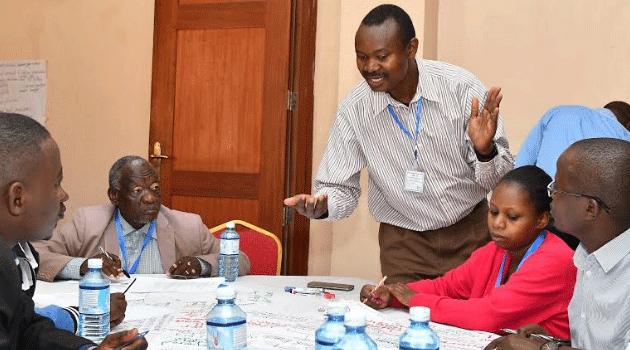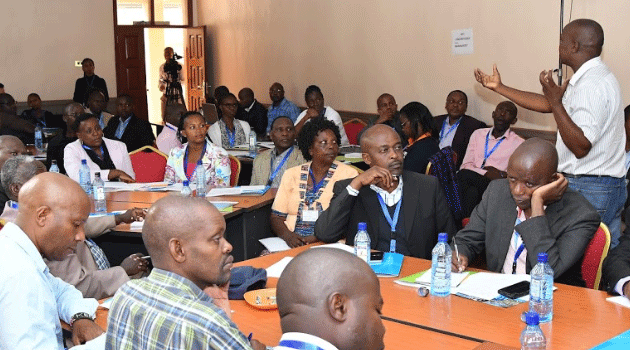NAIROBI, Kenya May 6 – Experts have warned that climate change is posing a serious threat to livelihoods and if not mitigated many nations risk facing serious food shortages.
Due to unpredictable weather patterns, farmers depending on rain-fed agriculture are registering loses and this affects the entire value chain leading to job loses hence poverty, according to Dr. John Recha, a research scientist at Climate Change Agriculture and Food Security Program (CCAFS).
He says, “it is high time farmers planted the right seeds and venture into crops that mature within a short window. Farmers also need to invest in crops which can withstanding emerging diseases pests like the Fall Army worm.”
Dr Recha was addressing a stakeholders knowledge sharing workshop in Nakuru organized by The Netherlands Development Organisation, SNV, which has injected 4 billion shillings in a regional initiative to train farmers on how to deal with the effects of climate change. The project that is known as Climate-Smart Agriculture East Africa is being implemented in Kenya, Uganda and Tanzania.
According to the project manager for the Kenya chapter Joseph Muhwanga, the program will work on climate-smart production of pulses, oil seeds, Irish potatoes and cereals.
“Each county will select specific crops along each value chains they want. Equally, each County will choose specific crops best suited for their areas,” he says.
Laureen Mwikali, a potato farmer from Njoro says many farmers are being discouraged because of unpredictable weather patterns. “But when you belong to a cooperative it is better because you benefit from group advantages.”
SNV is collaborating with Wageningen University & Research (WUR), the CGIAR Research Programme on Climate Change, Agriculture and Food Security (CCAFS), Agriterra and Rabo partnership in the climate-smart agriculture project.
“We shall work with the national and county government to see how we can create an enabling legal, institutional and regulatory framework, Muhwanga said.
The Chief Officer for Agriculture, Nakuru County Government, Joel Kibett said the county government was encouraging famers to grow potatoes because they can easily adapt to unpredictable rainfall, “Being a short season crop, requiring short rains to mature, we think it is a good crop, which can be used to mitigate the effects of climate change in the county,” he told the workshop.
Weathermen also have a crucial role to play in empowering farmers with knowledge to deal with climate change. James Gichuki Gathura, County Director of Metrological Services for Nakuru County says county weather forecasting is normally more specific to counties than what is forecast at the national level.
“Regarding weather in this area, there was no delay for the onset for this March, April and May. It went as we predicted. But with the existence of the tropical cyclone in the Mozambican channel, it caused what we call poor distribution of rainfall,” says Gathura.
The Managing Director of Agrimech Africa Ltd, Dr. Pascal Kaumbutho who has many years of experience in mechanized agriculture said mechanization can help overcome the effects of climate change.
‘With mechanization one can till the land faster, plant faster and harvest faster, process produce for storage faster. With potatoes for example, you will require 48 people to harvest potato on a 1 acre farm for a day, but a machine will take only 2 hours on the same piece of land,” he observed.
In an earlier workshop in Kitui town, farmers said irrigation has made a big impact in food production in the county. The county government at the same time is encouraging farmers to grow drought resistant crops like green grams.
Leah Muema, a farmer in Mosa sub-location, Kitui County is among the many farmers who have experienced the negative impact of erratic rainfall. “Last year rains were unpredictable and when it rained it was too much, it destroyed my Ndengu (green grams) crop. We also witnessed strange pests and diseases,” she said.
Kitui County Executive Committee member in charge of agriculture Emmanuel Kisangau said, “We want to empower farmers so that they can make informed decisions including planting at the right time and planting the right species so that they can adapt to the changing weather patterns.”
Experts say the use of climate smart agricultural innovations and technologies to adapt to or mitigate against effects of climate change is often limited to small group of farmers –mainly large scale farmers. Therefore, knowledge dissemination to small scale farmers for implementation at farm level along the entire value chain is critical. Statistics indicate that Kenya’s farming sector is pre-dominantly small scale and accounts for about 75% of the total agricultural output.
[Alex Chamwada is an Independent TV content producer]




































